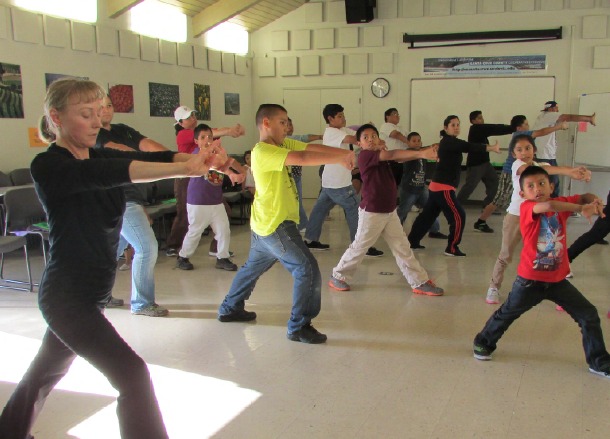
Share On Social!
At the Diabetes Health Center (DHC), a program of the Pajaro Valley Community Health Trust, Latino children and their families are learning how to be healthy.
After finding out that 49.3% of children in the area were overweight or obese, physicians and local leaders at the DHC knew something had to be done. So they decided to develop a pilot program to help Latino children succeed in achieving a healthy weight status.
Culturally Relevant Programming
With funding from the Children’s Miracle Network, and by partnering up with the Watsonville Health Center, the DHC was able to offer a 10-week bi-lingual nutrition education and physical activity program to 25 Latino kids and their families during the Summer and Fall of 2013. To meet the criteria as a participant, children had to have a body mass index (BMI) above the 85th percentile and be between the ages of 9-12.

Throughout the ten weeks, children who participated in the program learned about healthy lifestyle management, how to integrate low-cost physical activities into their daily lives, how to keep a fitness log, ways to prepare healthy foods, and methods to reduce stress. All courses were taught by a registered dietician and certified Zumba & Yoga instructors.
During physical activity sessions children and their families were introduced to activities such as Zumba, Yoga, and interval training.
The children also participated in interactive nutrition education sessions where they learned how to read nutrition labels, how to keep a food diary, and about portion control.
The registered dietician Jacky Thompson, who led many of the sessions said she even discussed food marketing with kids.
“Some of the information presented are things people might not typically consider,” Thompson said. “So we talked about food marketing and advertisements and how things are sold.”
How the Program Works
Physicians referred patients to the program and helped patients establish their individual goals, according to Rachel Ramirez-Ruiz, director of programs at the Diabetes Health Center.
“We kept the physicians involved every step of the way,” she said.

Ramirez-Ruiz added that through a unique partnership with the Central California Alliance for Health, they were able to reimburse primary care providers and offer participants a $25 gift-card.
BMI, behavioral outcomes, and emotional factors were recorded, to track the program’s success.
Ramirez-Ruiz and Camberos said they even saw a 73% improvement in problem solving and risk-reducing skills.
“Familes were able to continue these things at home so we felt that it was very important,” Veronica Camberos, a program associate with the Diabetes Health Center, said.
The DHC hopes to continue collaborating with local health care practitioners to offer children more programs like this. They say that hopefully the success of this pilot program would help demonstrate the need for medical insurance to reimburse services like medical nutrition therapy and nutrition counseling for children at risk for diabetes.
Explore More:
Healthy Families & SchoolsBy The Numbers
142
Percent
Expected rise in Latino cancer cases in coming years



